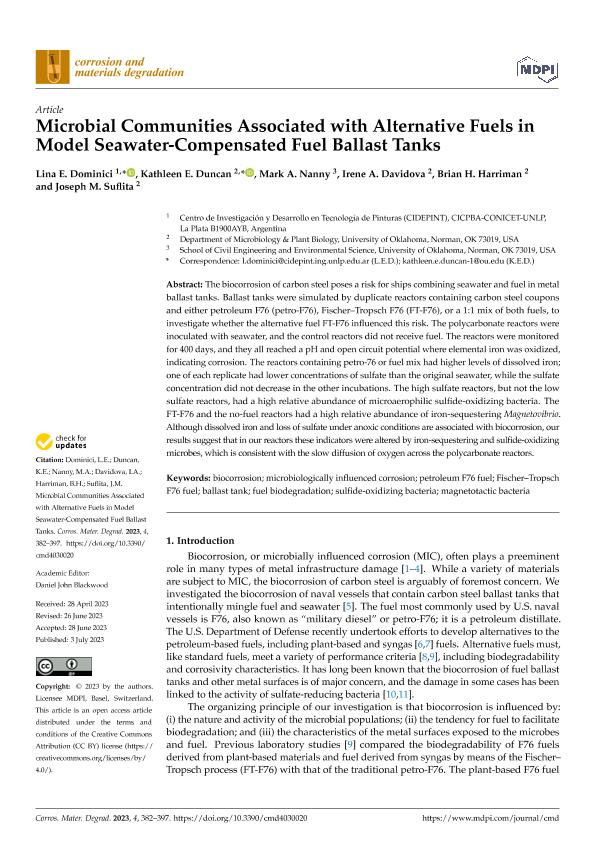Mostrar el registro sencillo del ítem
dc.contributor.author
Dominici, Lina Edith

dc.contributor.author
Duncan, Kathleen E.
dc.contributor.author
Nanny, Mark A.
dc.contributor.author
Davidova, Irene A.
dc.contributor.author
Harriman, Brian H.
dc.contributor.author
Suflita, Joseph M.
dc.date.available
2024-01-18T14:54:30Z
dc.date.issued
2023-07
dc.identifier.citation
Dominici, Lina Edith; Duncan, Kathleen E.; Nanny, Mark A.; Davidova, Irene A.; Harriman, Brian H.; et al.; Microbial Communities Associated with Alternative Fuels in Model Seawater-Compensated Fuel Ballast Tanks; MDPI; Corrosion and Materials Degradation; 4; 3; 7-2023; 382-398
dc.identifier.issn
2624-5558
dc.identifier.uri
http://hdl.handle.net/11336/224138
dc.description.abstract
The biocorrosion of carbon steel poses a risk for ships combining seawater and fuel in metal ballast tanks. Ballast tanks were simulated by duplicate reactors containing carbon steel coupons and either petroleum F76 (petro-F76), Fischer–Tropsch F76 (FT-F76), or a 1:1 mix of both fuels, to investigate whether the alternative fuel FT-F76 influenced this risk. The polycarbonate reactors were inoculated with seawater, and the control reactors did not receive fuel. The reactors were monitored for 400 days, and they all reached a pH and open circuit potential where elemental iron was oxidized, indicating corrosion. The reactors containing petro-76 or fuel mix had higher levels of dissolved iron; one of each replicate had lower concentrations of sulfate than the original seawater, while the sulfate concentration did not decrease in the other incubations. The high sulfate reactors, but not the low sulfate reactors, had a high relative abundance of microaerophilic sulfide-oxidizing bacteria. The FT-F76 and the no-fuel reactors had a high relative abundance of iron-sequestering Magnetovibrio. Although dissolved iron and loss of sulfate under anoxic conditions are associated with biocorrosion, our results suggest that in our reactors these indicators were altered by iron-sequestering and sulfide-oxidizing microbes, which is consistent with the slow diffusion of oxygen across the polycarbonate reactors.
dc.format
application/pdf
dc.language.iso
eng
dc.publisher
MDPI
dc.rights
info:eu-repo/semantics/openAccess
dc.rights.uri
https://creativecommons.org/licenses/by/2.5/ar/
dc.subject
BIOCORROSION
dc.subject
MICROBIALLY INFLUENCED CORROSION
dc.subject
FUEL BIODEGRADATION
dc.subject
BALLAST TANK
dc.subject.classification
Ingeniería del Petróleo, Energía y Combustibles

dc.subject.classification
Ingeniería del Medio Ambiente

dc.subject.classification
INGENIERÍAS Y TECNOLOGÍAS

dc.title
Microbial Communities Associated with Alternative Fuels in Model Seawater-Compensated Fuel Ballast Tanks
dc.type
info:eu-repo/semantics/article
dc.type
info:ar-repo/semantics/artículo
dc.type
info:eu-repo/semantics/publishedVersion
dc.date.updated
2023-12-11T19:34:43Z
dc.journal.volume
4
dc.journal.number
3
dc.journal.pagination
382-398
dc.journal.pais
Suiza

dc.description.fil
Fil: Dominici, Lina Edith. Provincia de Buenos Aires. Gobernación. Comisión de Investigaciones Científicas. Centro de Investigaciones en Tecnología de Pinturas. Consejo Nacional de Investigaciones Científicas y Técnicas. Centro Científico Tecnológico Conicet - La Plata. Centro de Investigaciones en Tecnología de Pinturas; Argentina
dc.description.fil
Fil: Duncan, Kathleen E.. University Of Oklahoma. Departament Of Botany And Microbiology; Estados Unidos
dc.description.fil
Fil: Nanny, Mark A.. Oklahoma State University; Estados Unidos
dc.description.fil
Fil: Davidova, Irene A.. University Of Oklahoma. Departament Of Botany And Microbiology; Estados Unidos
dc.description.fil
Fil: Harriman, Brian H.. University Of Oklahoma. Departament Of Botany And Microbiology; Estados Unidos
dc.description.fil
Fil: Suflita, Joseph M.. University Of Oklahoma. Departament Of Botany And Microbiology; Estados Unidos
dc.journal.title
Corrosion and Materials Degradation
dc.relation.alternativeid
info:eu-repo/semantics/altIdentifier/url/https://www.mdpi.com/2624-5558/4/3/20
dc.relation.alternativeid
info:eu-repo/semantics/altIdentifier/doi/http://dx.doi.org/10.3390/cmd4030020
Archivos asociados
